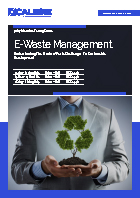| Date | Venue | Fee | |
|---|---|---|---|
| 17 Aug - 21 Aug 2026 | Dubai – UAE | $ 5,950 | Register Now |
| 07 Dec - 11 Dec 2026 | Dubai – UAE | $ 5,950 | Register Now |
About the Course
Recycling is considered environmentally friendly because it prevents hazardous waste, including heavy metals and carcinogens, from entering the atmosphere, landfills or waterways. While electronics consist of a small fraction of total waste generated, they are far more dangerous. There is stringent legislation designed to enforce and encourage the sustainable disposal of appliances. The most notable is the Waste Electrical and Electronic Equipment Directive of the European Union and the United States National Computer Recycling Act.
The term 'Waste Management' collectively means the management of waste from its inception to the final disposal stage. Thus, as one single unit, it encompasses right from the collection, disposal, and recycling to which the processes of monitoring and regulation, respectively, belong, along with the legal frameworks that enable the occurrence of waste management.
"E-waste" is a popular, informal name for electronic products nearing the end of their "useful life." E-Wastes are considered dangerous, as specific components of some electronic products contain hazardous materials, depending on their condition and density. The hazardous content of these materials poses a threat to human health and the environment. Discarded computers, televisions, VCRs, stereos, copiers, fax machines, electric lamps, cell phones, audio equipment, and batteries can leach lead and other substances into soil and groundwater if improperly disposed of. Many of these products can be reused, refurbished, or recycled in an environmentally sound manner to be less harmful to the ecosystem.
Core Objectives
By learning this training course, the delegates will understand and be familiar with:
- Understand the basics of E-Waste
- Clearly understanding of responsibilities of all stakeholders in the value chain for implementing the rules
- Key challenges of E-Waste management from a regulator's
- Knowledge about Resources and toxic material in e-waste and their effects
- Developing action plans containing detailed steps and activities on
- How to proceed with the proper implementation of the Rules
Training Approach
The delegates will learn by active participation through inspiring presentation tools and interactive techniques presented in a lively, enthusiastic and exciting style. They will participate in practical exercises, case studies, and an EMS step-by-step practical workshop.
This E-Waste Management training course is presented using PowerPoint presentations and videos. Case studies further enhance the learning outcome and encourage the delegates to gain through the group's personal experiences.
The Attendees
This E-Waste Management training course is for anyone interested in the topic of E-Waste. Still, it will be of particular interest to policymakers, designers, and businesses looking for inspiration on the potential of circular economy models.
Whether you’re a student, entrepreneur, innovator... or E-Waste hoarder, the training course will increase your knowledge and potentially germinate new thinking and ideas.
The training course is suitable to a wide range of professionals but will greatly benefit all staff with responsibility for the identification, storage, transfer and disposal of E-Waste, including:
- Health and Safety Managers
- Environmental Managers
- Facility Managers
- Operations Personnel & Managers
- Shift Supervisors & Shift Team Leaders
- Process and Warehouse Staff
Daily Discussion
DAY ONE: SUSTAINABLE E-WASTE: A GLOBAL ISSUE
- Introduction to E-Waste Management
- Regulatory Framework & Compliance Requirements
- Composition of E-Waste
- Environmental & Health Issues
- Understanding the Life Cycle of Waste
DAY TWO: WASTE PREVENTION
- An Explosion of E-Waste
- What happens to E-Waste Around the World?
- E-Waste Collection System
- Extended Producer Responsibility
- Recycling E-waste: Practices & Challenges
DAY THREE: E-WASTE RE-USE AND RECYCLING
- Procedures for Setting up E-Waste Recycling Facilities
- Environmentally Sound Management of E-Waste
- Role of the Informal Sector in E-Waste Management
- Approach Towards Effective Management Systems for E-Waste
- Auditing E-Waste Management in the Organisation
DAY FOUR: IMPACTS AND SOLUTIONS
- What’s Inside your E-Waste?
- E-Waste Impacts: Environment, Society, And Health
- E-Waste Impact on Climate
- Opportunities and Game-Changing Solutions
- Take Action: Planning a Campaign
DAY FIVE: REDUCING E-WASTE BY DESIGN, STANDARDS, BUSINESS AND POLICY
- Preventing E-Waste by Design
- E-waste Across Borders: International Co-operation and Control
- Instruments, Policies and Incentives to Ensure E-Waste is Moved and Managed according to International Agreements and Best Practices
- International Standards and Guidelines: Insights into the International Telecommunication Union (ITU) Standards and Guidelines from MPPI, PACE and SRI
E-Waste Action Plans and the Way Forward
Certificate Awarded
Upon successful completion of this training course, participants will be awarded a Certificate of Completion from XCalibre Training Centre, acknowledging their accomplishment. This certificate serves as a testament to their dedication to developing their skills and advancing their expertise in their respective fields.



